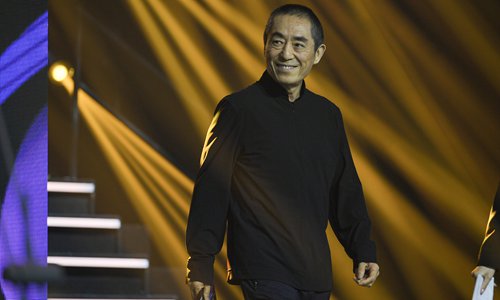A look back
By Zhang Ni Source:Global Times Published: 2019/9/28 15:48:40

Chinese film director Zhang Yimou Photo: IC
Born in Xi'an, Northwest China's Shaanxi Province in April 1950, famed Chinese director Zhang Yimou has stood witness to decades of changes in China's film industry.
As one of China's Fifth Generation of filmmakers, Zhang helped popularize Chinese film around the world with works such as Raise the Red Lantern, House of Flying Daggers and The Great Wall. His films have won prizes at the Cannes Film Festival, the Venice Film Festival and the Berlin International Film Festival, and six of his films have been nominated for Academy Awards.
"I have so many stories with the People's Republic of China (PRC), and the things that influenced me the most would be the reform and opening up and the restoration of the gaokao exams," Zhang told the Global Times.
Gaokao, the high-stakes exam officially known as the National College Entrance Examination, was restored in 1977 after a decade-long hiatus due to the Cultural Revolution (1966-76).
"For our generation, going to the Beijing Film Academy was a life-changing opportunity. It was a gift of the times," said Zhang.
"I probably would have been a worker in a textile factory in Xianyang [Shaanxi Province] and would have retired by now if there was no gaokao."
"If you don't know what you can do or what potential you have, how could you even know that you can be a director?" Zhang stated.
"Therefore, the era bestowed on me a new life and opportunity."
Creating miracles
As the director of the opening and closing ceremonies of the 2008 Beijing Olympic Games, Zhang noted that the event impressed him a lot.
Eleven years have passed in a flash since that event, and China will hold the Winter Olympic Games soon, making Beijing the only city and the Bird's Nest the only stadium in the world to hold both Summer and Winter Olympic Games, said Zhang. "This is a miracle created by the Chinese people."
The director stated that the opening ceremony of the 2008 Olympic Games has become a classic, and the International Olympic Committee has recognized that it is unparalleled among all other openings.
"It wasn't easy for the Chinese people to achieve such a thing," said Zhang.
"China suddenly had such an opportunity to show itself to the world in the process of the reform and opening up, which gave us a unique feeling that it could only have happened during that specific time and is not something that can be repeated," Zhang noted.
"A performance represents your culture, your posture and the development of the country," said the director.
For example, while audiences around the world were impressed by the sheer amount of people involved in the 2008 opening ceremony, they were also amazed by the eight-minute show at the closing ceremony in Pyeongchang Olympics in 2018 that was performed by 24 robots skidding over the snow and ice-covered ground, Zhang noted.
Zhang said that it represents the progress of the country when modern technology is used in such a performance.
A team led by Zhang also produced a gala based on his Impression of West Lake show, a performance that combines music, dance and a light show with the lake as a natural backdrop, for the first night of the G20 summit in Hangzhou, East China's Zhejiang Province in 2016.
"I am probably one of the most crossover directors in China," said Zhang.
"Doing stuff in different fields is all about learning, and things related to art can be integrated and interacted with."
"Your ideas, accomplishments and familiarities with information and resources will all be reflected in your works," Zhang said.
Homegrown films
Zhang stated that he intends to keep up with today's rapidly changing society, and that he thinks that modern technology and new ideas are the measures by which he can keep his works fresh.
"China is quickly becoming the world's largest box office and film market, so blockbusters will continue appearing on Chinese screens," the director noted.
"It sets higher standards for Chinese filmmakers to produce more excellent and diversified works that are worthy of the market."
Based on data from the Film and Television Vane, a film review program produced by Central China Television, China's film industry first started to grow in 2002, when director Zhang Yimou's Hero was first screened, putting an end to a decade-long recession for the Chinese movie industry.
"Hollywood does not represent the highest standard," said Zhang.
"I think it is more important to study how to make movies in our own land and environment."
"Although film is a product of globalization, it is more a showcase of local culture, so Chinese filmmakers should understand traditional Chinese culture, Chinese people and Chinese society and create our own good works on our own land," Zhang stated.
Zhang noted that blockbusters such as Wolf Warrior 2, The Wandering Earth, Ne Zha and Dying To Survive are very typical Chinese movies, and the reason why Chinese audiences like them is that they are just like Chinese food to Chinese people.
"These movies express our feelings and spirit," said Zhang.
"We should make the best of us and have our own standard rather than following Hollywood's US standard," Zhang noted.
"China's movies will naturally influence the world when China and China's movie industry become strong."
Sun Haoran contributed to the story
Newspaper headline: Director Zhang Yimou talks about the role of film and culture in China’s rise